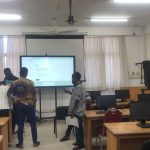Professor of Social Anthropology at the University of Bayreuth and MIASA Fellow, Erdmute Alber has reiterated the call for political authorities in Benin to liaise with stakeholders to invest adequate state resources into the educational sector in the northern part of the country to bridge the quality gap with the southern region.
The call comes on the back of the Merian Institute for Advanced Studies in Africa (MIASA) holding its 6th Public lecture series for the academic year.
The Public Lecture series have been designed by the Institute to project the research findings of the various Fellows on selected topics in their fields of expertise to educate the general public as well contribute to shaping public policy.
The lecture was held on the theme “Responsibilizing parents to overcome blindness; changing intergenerational relations through education for all in Northern Benin”.
Speaking at the well attended event, Professor Erdmute Alber intimated that the crux of her research focused on the discussing how parents in the northern part of Benin view education of their wards with regards to the use of family resources to invest in educating their wards to have brighter future prospects against prevailing social norms which can impede access to the benefits of education.
She added that per her research findings and onfield engagements , there was considerable evidence that parents inspite of prevailing economic and social conditions saw education of their wards as a vehicle to empowering local communities and achieving wholistic economic and social development.
” The basis of my research interest in the northern part of Benin was investigate how much value society and parents in that part of the country place on taking their wards to school to develop their fullest potentials and to be able to transform society through the knowledge and experiences gained in there to propel and generate economic values for families and the society at large.
It is worthy to note that as against certain perceptions widely held, there was no palpable evidence to show that modern parents were being impeded by existing social norms not to invest in the education of their children but rather most parents inspite of economic disadvantages , have been able to pull together resources to enrol a healthy number of children into the school system to enhance their future prospects”.
Also, Professor Alber revealed that there has been state policy on education being rolled out in the north of the country as pertains in the south but economic disadvantages and other societal pressures very prevalent in the north must be tackled head on to ensure that the education policy bears the best fruits intended for by the policymakers.
” Findings of my work reveal that just like in many countries in the West African sub region , there exists a large chasm between development in the South of Benin as compared to the northern part , but inspite of social challenges high rate school drop outs , teenage pregnancies and endemic poverty , policy makers and local authorities must take deliberate steps to invest more resources into the school system in North to reduce barriers of entry to children of school going age to support the best efforts of their families and parents.
Local authorities must collaborate with stakeholders in the communities to build educational infrastructure of similar quality as pertains in the South and focus on training quality teaching and non teaching staff to help bridge the gaps for the children who live in that geographical location to fulfill their fullest potentials which in the long run, will benefit the local communities and by extension the country in the form of sustainable economic and social development”.
Professor Erdmute Alber is a German Ethnologist with research focus in political and kinship anthropology . Since 2010, she has held the Professorial Chair in Social Anthropology at the University of Bayreuth.




